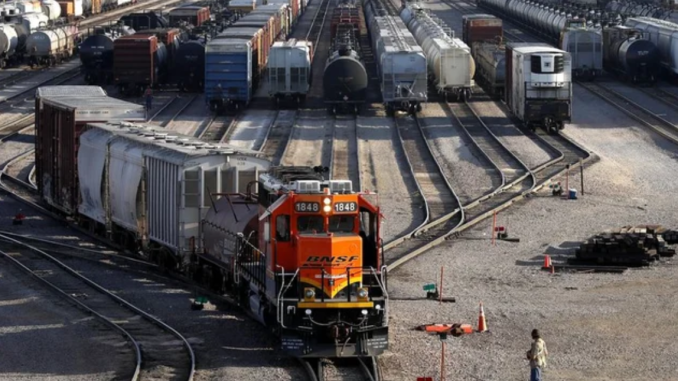
The Biden administration has inserted itself into negotiations between the nation’s largest rail carriers and eight unions representing railroad workers to avoid a potential strike that could deal a major blow to the U.S. economy.
The National Mediation Board and Labor Secretary Marty Walsh met Wednesday with leaders of both sides in hopes of reaching an agreement before workers’ current contract runs out at midnight on Sept. 16.
Negotiators met with the Mediation Board on Thursday and talks are expected to continue Friday in hopes of reaching an agreement before unionized railroad workers walk off the job.
If a strike happens, it runs the risk of halting the U.S. supply chain at a time when it is already stymied with bottlenecks, which has contributed to soaring inflation. It would also come as the peak season for transporting agricultural products is looming.
The American Association of Railroads said in a statement Thursday that a shutdown could cost the economy roughly $2 billion per day and “immediately harm every economic sector,” triggering “retail product shortages, widespread manufacturing shutdowns” and “job losses.”
The rail workers are represented by 13 unions that have spent years trying to renegotiate their contracts with rail carriers, represented by the National Carriers’ Conference Committee.
The workers are looking for changes in the carriers’ policies related to long hours, paid leave, and being on-call.
In a statement issued on Labor Day, two union leaders representing engineers and conductors slammed the rail carriers for their policies.
The union leaders said their workers have “borne the brunt of inept crew management, life-changing attendance policies, and working conditions over the past years that are making it all but impossible for rail carriers to hire and retain operating employees.”
If the parties continue to bicker, Congress can step in and order the rail workers to return to their jobs.
President Biden in July appointed a Presidential Emergency Board that proposed increasing workers’ salaries by 24% and adding thousands of additional bonuses over a five-year contract. Roughly 115,000 workers would be covered under the plan.
However, only five of the 13 unions agreed to the deal.
* Article from: The Washington Times